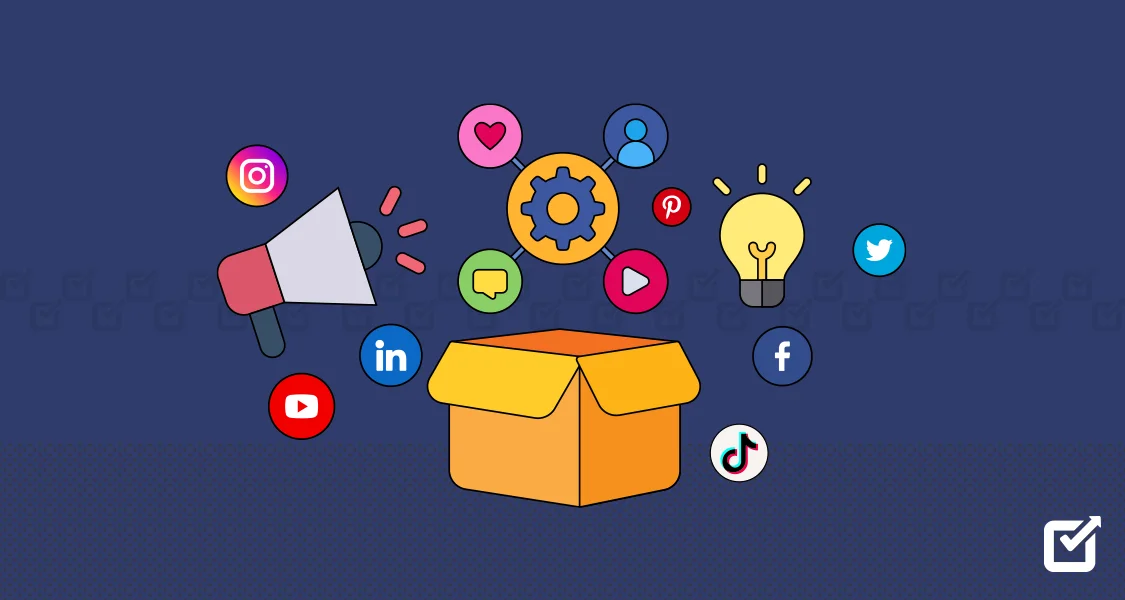Did you know businesses utilizing advanced customer service tools witness a 92% customer satisfaction rate? This stat shows the impact of leveraging the right tools for your support game.
So, whether you’re a seasoned professional or just dipping your toes into customer service, you must leverage the right customer service software to boost your customer satisfaction rate. And it’s not just about features and functionalities; you must find the perfect companion that understands your business’s unique requirements.
This guide highlights key facts, emphasizing the benefits of using social inbox tools. We’ll also explore the 15 best customer service software programs in 2024!
What Is Customer Service Software?
Customer service software is a powerful tool that your business can use to provide excellent customer support and assistance. Think of it as a digital helper streamlining and organizing all customer-related interactions.
Imagine you run a shop, and people come in with questions, requests, or even little problems here and there. Instead of keeping all that info on sticky notes or in your head, customer service software helps you organize and manage it.
It helps you keep track of who your customers are, what they need help with, and when they need it. This tool also helps you reply faster and keeps all your customer conversations in one neat place.
So, when someone asks, “Hey, can you help me with this?” – BOOM! You’ve got all the info to serve your customers better. That’s customer service software – making your business life a whole lot easier and your customers a whole lot happier.
Elevate Your Customer Service with Social Champ Inbox!
Seamlessly manage social media interactions, respond promptly to inquiries, and foster meaningful connections with your audience.
7 Compelling Reasons Why You Should Use Customer Service Software?
You can use these tools to streamline communication with your customers. Let’s take a look at seven reasons that will compel you to download customer service software programs.
Improved Response Times
With customer service chat software, businesses can respond to customer inquiries faster than those who don’t utilize the software. This swift responsiveness is crucial in today’s fast-paced digital environment.
Increased Efficiency
Customer service software can boost operational efficiency by 30%, according to CyberSwift. Automating repetitive tasks and efficiently handling customer interactions contribute to time savings and smoother workflows.
Better Issue Resolution Rates
Businesses leveraging customer service chat software can witness a great improvement in first-contact resolution rates, as indicated by Knowmax. This means quicker solutions for customers, reducing the need for multiple interactions.
Customer Retention
Retaining customers is not just about acquiring new ones; it’s about nurturing long-term relationships. According to a Microsoft study report, 96% of respondents cited that customer service is crucial in their choice of loyalty to a brand.
Data-Driven Decision-Making
With customer service software, businesses can analyze customer interactions and feedback. According to McKinsey, organizations that use data-driven insights for customer service see a 25% increase in agent productivity.
Cost Savings
Adopting customer service software can lead to significant cost reductions. A report by McKinsey suggests that businesses can achieve cost savings of up to 50% by leveraging automation and self-service features.
Competitive Advantage
Utilizing advanced customer service software provides a competitive edge. A survey by Microsoft found that 97% of customers say customer service is a critical factor in their brand choice and loyalty.
The above statistics highlight the compelling reasons you should seriously consider using customer service software. They emphasize the reasons why you should use customer service software not only to meet customer expectations but also to exceed them.
12 Benefits of Customer Support Software
Customer support software brings many benefits to businesses aiming to enhance their customer service operations. The following are 12 advantages of using customer support software:
Efficient Ticket Management
Customer support software often includes ticketing systems that help businesses organize and prioritize customer inquiries. This ensures that each customer issue receives proper attention and is resolved in a timely manner.
Improved Response Time
With features like automated responses and smart routing, customer support software helps businesses respond to customer queries swiftly. Faster response times increase customer satisfaction (CSAT).
Centralized Customer Information
Customer support software centralized customer data, allowing support agents to access relevant information easily. This ensures a personalized and efficient interaction with customers, as agents have a comprehensive view of their history and needs.
Enhanced Communication Channels
Modern customer support software supports various communication channels, including email, live chat, and social media. This versatility enables businesses to engage with customers on their preferred platforms, increasing accessibility and convenience.
Automation of Repetitive Tasks
By automating routine tasks, such as ticket categorization and initial responses, customer support software frees up time for support agents. This allows them to focus on more complex issues that require human intervention.
Knowledge Base for Self-Service
Many customer support software solutions include a knowledge base where customers can find answers to common questions. This empowers users to resolve issues independently, reducing the workload on support teams.
Real-Time Analytics and Reporting
Customer support software provides insights into support performance through analytics and reporting tools. Businesses can track key metrics, such as resolution times and customer satisfaction scores, enabling data-driven decision-making.
Multi-Channel Support
Businesses can provide support across various channels with customer support software, offering a seamless and consistent experience. Whether through email, chat, or social media, customers receive support on their preferred platforms.
Increased Customer Satisfaction
The combination of efficient communication, timely responses, and issue resolution contributes to an overall improvement in customer satisfaction. Satisfied customers are more likely to become repeat customers and brand advocates.
Scalability and Flexibility
Customer support software is designed to scale with the growth of the business. It adapts to changing needs and can accommodate increasing customer interactions without compromising efficiency.
Cost Savings
Automating tasks, streamlining processes, and reducing response times contribute to cost savings. Customer support software can optimize resource allocation and reduce the need for extensive manual intervention.
Proactive Customer Engagement
Customer support software enables businesses to engage with customers proactively. By anticipating needs and addressing potential issues, businesses can build stronger customer relationships and prevent problems before they escalate.
Related Article: Twitter for Customer Service: Why Brands Should Use It in 2024
What Are the Different Types of Customer Service Software?
Customer service software comes in various types, each serving specific functions to streamline and enhance customer support processes. Here are the different types:
- Ticketing Systems: These systems organize and prioritize customer inquiries in tickets, facilitating efficient tracking and resolution.
- Live Chat Software: This software enables real-time communication between customers and support agents, offering instant assistance and issue resolution.
- Knowledge Base Software: This type of software provides a centralized repository of information for customers to find answers to common questions and troubleshoot issues independently.
- Call Center Software: You want this software if you need a solution that facilitates the management of phone-based customer interactions, including call routing, monitoring, and reporting.
- Social Media Management Tools: Also known as social media customer service software, social media management tools are handy platforms that allow businesses to manage their social media sites, monitor key metrics, and engage with customers, ensuring a presence in online conversations.
- CRM (Customer Relationship Management) Software: This type of software manages and organizes customer information, interactions, and relationships to improve customer understanding and engagement.
- Automation Tools: These are platforms that automate repetitive tasks and processes, saving time and increasing efficiency in customer support operations.
- Survey and Feedback Tools: These gather customer feedback and insights through surveys, helping businesses understand customer satisfaction and areas for improvement.
- Self-Service Portals: These are platforms that empower customers to find answers and information independently, reducing the need for direct support interactions.
- Each type of digital customer service software plays a crucial role in addressing specific aspects of customer support, contributing to a comprehensive and efficient support ecosystem.
What Are the Most Common Customer Service Software Features?
Customer service software typically includes a variety of features designed to streamline support operations and enhance customer interactions. Here are eight common features include:
Ticketing System
A ticketing system is crucial for organizing and managing customer inquiries. It assigns a unique identifier to each customer query, allowing support teams to categorize, prioritize, and track the status of each ticket. This structured approach ensures that no customer issue gets overlooked and streamlines the workflow for efficient resolution.
Multi-Channel Support
Customers reach out through various channels, such as email, chat, social media, and more. Multi-channel support ensures businesses can engage with clients on their preferred platforms, providing flexibility and convenience. It provides a seamless and responsive customer service experience across diverse communication channels.
Workflow Automation
Automation features reduce manual efforts and enhance efficiency in customer service operations. Tasks like ticket assignments, response emails, and routine queries can be automated, allowing support teams to focus on more complex issues. Furthermore, automation ensures a faster response time, increases productivity, and contributes to a smoother customer service workflow.
CRM Integration
Customer Relationship Management (CRM) integration ensures that support teams have access to comprehensive customer information. This empowers agents to provide personalized and contextually relevant responses. CRM integration also facilitates a unified view of customer interactions across the organization, enhancing collaboration between sales, marketing, and support teams.
Reporting and Analytics
Reporting and analytics tools offer insights into support team performance, customer satisfaction, and overall service effectiveness. Data-driven decision-making becomes possible, allowing businesses to identify trends, measure the impact of customer service strategies, and continuously optimize their approach for better outcomes.
Collaboration Tools
Collaboration tools facilitate communication and teamwork within support teams. Shared inboxes, internal messaging, and collaborative features ensure team members can work seamlessly together. This fosters a cohesive approach to addressing customer inquiries and contributes to a more efficient and collaborative work environment.
Escalation and Routing Rules
Escalation and routing rules ensure that customer inquiries are directed to the right team or individual based on their nature and urgency. This helps in prioritizing tasks, ensuring that critical issues are addressed promptly. It also streamlines the workflow, preventing bottlenecks and delays in resolving customer queries.
Featured Article: A Detailed Guide on Cross Channel Marketing in 2024
15+ Best Customer Service Tools
Social Champ Inbox

Social Champ Inbox Tailored for businesses seeking to elevate their social customer service, Social Champ Inbox provides a centralized platform where you can seamlessly manage, respond, and analyze social media interactions. This feature-packed solution empowers your customer service team and enhances your overall social media presence.
Key Features:
Unified Inbox
Social Champ Inbox consolidates messages from various social media platforms, including Facebook, Twitter, Instagram, and LinkedIn. This unified inbox ensures that your customer service team has a single platform to efficiently manage and respond to customer inquiries.
Real-Time Engagement
This handy tool enables your team to engage with your audience instantly, fostering proactive and immediate customer interactions.
Analytics for Actionable Insights
You can also use Social Champ Inbox to better understand your social media performance. Thanks to its powerful analytics feature, you can track engagement metrics, customer sentiments, and social media trends. This can allow you to make data-driven decisions and continually refine your customer service strategy.
Automation for Efficiency
Social Champ Inbox streamlines your social media operations by automating routine tasks. From message categorization to automated responses, the platform enhances efficiency, enabling your team to focus on personalized interactions.
Scheduling for Strategic Presence
This robust platform also allows you to stay active and relevant by scheduling posts and updates at optimal times. This way, you can ensure your customers receive timely information and maintain a consistent and engaging social media presence.
Use Social Champ to Automate for Productivity!
Streamline routine tasks, manage workflows effortlessly, and free up time for your team to focus on what matters.
Hootsuite Inbox

Hootsuite Hootsuite Inbox is a customer service software solution that focuses on transforming social media interactions into meaningful and efficient customer engagements.
Like Social Champ Inbox, Hootsuite Inbox offers a unified inbox that aggregates messages from different social media channels, including Facebook, Twitter, Instagram, and LinkedIn. This consolidated view ensures support teams can efficiently manage and respond to customer inquiries from a single platform.
The platform also provides internal communication tools that facilitate seamless collaboration among support agents. This ensures the entire team is aligned, enabling them to collectively address customer needs.
Zendesk

Zendesk This is a three-in-one solution – an online help desk platform, customer service ticketing software, and CRM – that provides customer service agents with all the tools they need to respond to customer requests from multiple channels.
Zendesk’s robust ticketing system helps to manage customer inquiries, issues, and requests efficiently. Each ticket captures customer interactions and facilitates collaboration among support agents.
The platform also includes a comprehensive knowledge base where businesses can create and organize articles to help customers find answers independently, reducing the need for direct support.
Freshdesk

Freshdesk Freshdesk is known for its user-friendly interface, making it accessible and adaptable for businesses of varying sizes, from small startups to larger enterprises.
Aside from being user-friendly, this customer service management software offers multi-channel support. It supports customer interactions across multiple channels, including email, chat, phone, and social media. This ensures flexibility in communication and caters to diverse customer preferences.
HubSpot Service Hub

HubSpot With its seamless integration into the HubSpot Growth Suite, Service Hub is a pivotal component of a holistic customer-centric strategy. It facilitates efficient customer service operations through features like CRM integration, ticketing systems, and knowledge base management.
Service Hub’s commitment to customer satisfaction is evident in its emphasis on proactive engagement, automation, and analytics. In combination, these features create a customer service ecosystem geared towards solving problems and exceeding expectations.
Salesforce Service Cloud

Salesforce Service Cloud Salesforce Service Cloud goes beyond conventional issue resolution, aiming to build lasting and meaningful customer relationships. The platform’s multi-channel support ensures businesses can engage with customers across various channels, including email, social media, chat, and phone, creating a unified and consistent service experience.
Central to this customer service software’s functionality is its seamless integration with Salesforce CRM, providing a comprehensive view of customer interactions and history. This integration empowers support teams to offer personalized and contextually relevant solutions, turning each interaction into an opportunity to deepen customer relationships.
Intercom

Intercom Intercom stands at the forefront of customer service software, setting a new standard for businesses seeking to engage with their customers more personalized and conversationally.
What sets Intercom apart is its emphasis on humanizing customer interactions through a seamless and dynamic conversational experience. From live chat to automated messaging, Intercom provides a platform where your business can build relationships, understand customer needs, and deliver exceptional service.
Front

Front Designed to transform how teams manage customer interactions, Front provides a unified platform that merges email, messages, and collaborative workflows into a seamless and efficient experience.
Additionally, this customer service software integrates seamlessly with CRM systems and other tools, providing support teams with a comprehensive view of customer information.
Whether you’re a small team or a large enterprise, Front can empower your business to deliver exceptional customer service through streamlined communication and collaborative workflows.
Tidio

Tidio Tailored to meet the demands of modern communication, Tidio seamlessly integrates live chat, chatbots, and messaging apps to provide a unified platform for efficient and personalized customer interactions.
Tidio goes beyond traditional live chat solutions with its multi-channel approach. Integrating seamlessly with popular messaging apps such as Facebook Messenger, WhatsApp, and Instagram, Tidio ensures that businesses can connect with customers on their preferred platforms. This versatility allows for a more personalized and convenient customer service experience.
HappyFox

HappyFox At its core, HappyFox excels in ticketing management, empowering support teams to efficiently handle customer inquiries, prioritize tasks, and automate routine processes.
This customer service software also provides multi-platform support across various channels, including email, chat, social media, and web forms. This multi-channel approach ensures that customers can reach out through their preferred means, fostering flexibility and convenience.
This customer service software also offers analytics and reporting tools that provide valuable insights into support team performance, customer satisfaction, and ticket resolution times. You can utilize these tools to make data-driven decisions and optimize your customer service strategy.
Zoho Desk

Zoho Desk With a focus on efficiency, automation, and collaboration, Zoho Desk provides a suite of tools designed to streamline customer support operations and elevate the overall customer experience.
Zoho Desk leverages automation and AI-powered tools to enhance efficiency. From automated ticket assignment to using AI for smart responses, businesses can automate routine tasks, allowing support teams to focus on more complex customer issues.
ServiceNow

ServiceNow ServiceNow is designed to streamline and automate customer service workflows. It provides a comprehensive system that aligns support operations with broader business objectives. Its expansive capabilities include robust ticketing systems, intelligent automation, and deep analytics.
The platform’s strength lies in its ability to integrate customer service processes seamlessly with other business functions, creating a holistic approach to service management. The platform incorporates AI-driven tools to optimize workflows and enhance responsiveness.
LiveAgent

LiveAgent LiveAgent focuses on providing an all-in-one platform that integrates various communication channels, customer support tools, and automation features. This integration creates a cohesive and efficient system for delivering exceptional customer service.
With a user-friendly interface and robust analytics tools, this digital customer service software empowers businesses to not only manage customer interactions effectively but also gain valuable insights into support performance for continuous improvement.
Hiver

Hiver Hiver recognizes the significance of email in customer interactions. It streamlines this process by turning shared inboxes into collaborative hubs for support teams.
This innovative strategy enables businesses to manage customer inquiries directly within their email interface. It also fosters seamless collaboration and ensures a unified approach to customer service.
In addition to shared inboxes and automation, Hiver integrates seamlessly with CRM systems, enhancing the overall customer service experience. This integration provides support teams quick access to customer information directly within the email interface.
Groove HQ

Groove Groove HQ focuses on creating a collaborative environment that enhances communication and efficiency within support teams. Its shared inbox consolidates customer inquiries into a centralized platform, making them accessible to multiple team members. This collaborative approach ensures that support teams can collaborate seamlessly, sharing information, assigning tasks, and resolving issues efficiently.
This customer service management software excels in automating routine tasks, offering time-saving features, such as canned responses, automated ticket assignments, and workflow automation. These automation tools boost the productivity of support teams and contribute to faster response times, enhancing the overall customer experience
Help Scout

Help Scout Help Scout places a strong emphasis on personalization in customer interactions. The platform allows businesses to create custom customer profiles, providing support teams with valuable context for each interaction. This enables businesses to go beyond generic responses, delivering tailored solutions that resonate with each customer’s unique needs.
Moreover, Help Scout integrates seamlessly with various third-party tools and platforms. This enhances this customer service software’s versatility and ensures businesses can leverage existing tools to enrich the customer service experience.
In Conclusion
As you strive to enhance customer service experiences, this guide stands as a compass, helping you make informed decisions and choose the software that aligns with your business goals. Whether aiming for streamlined automation, multi-channel support, or a user-centric approach, the best customer service software acts as a strategic ally, shaping the way your business connects with and serves its customers.
Social Champ, with its robust analytics and scheduling features, stands out as a valuable asset in the arsenal of customer service tools. In the age of social media dominance, the platform’s ability to analyze trends, monitor customer sentiments, and schedule strategic posts can provide you with a powerful mechanism to connect with your audience.






























